Live
- Gentle in manner, resolute in convictions: Sonia Gandhi pens emotional note for Dr. Manmohan Singh
- 2024: A landmark year for India's defence achievements and breakthroughs
- 2025 Horoscopes: Insights and Guidance by Pt. Umesh Chandra Pant
- Osamu Suzuki was a legendary figure in global auto industry: PM Modi
- “AMOEBA”: Celebrating the Journey of Telugu Entrepreneur Sri Motaparti Siva Rama Vara Prasad
- Sachin Khedekar recites a poem from director Feroz Abbas Khan’s powerful new play, ‘Hind 1957’
- NABL-QCI appoints Dr. Sandip Shah as chairperson
- Centre transfers Rs 2.23 lakh crore for 1,206 schemes under Direct Benefit Transfer
- BGT 2024-25: Watching Konstas bat reminds me of Symonds, says Hayden
- 75 iconic lighthouses in India saw more than 10 lakh visitors till September
Just In
Withering away: Bamboo artisans suffer hardships in Hyderabad

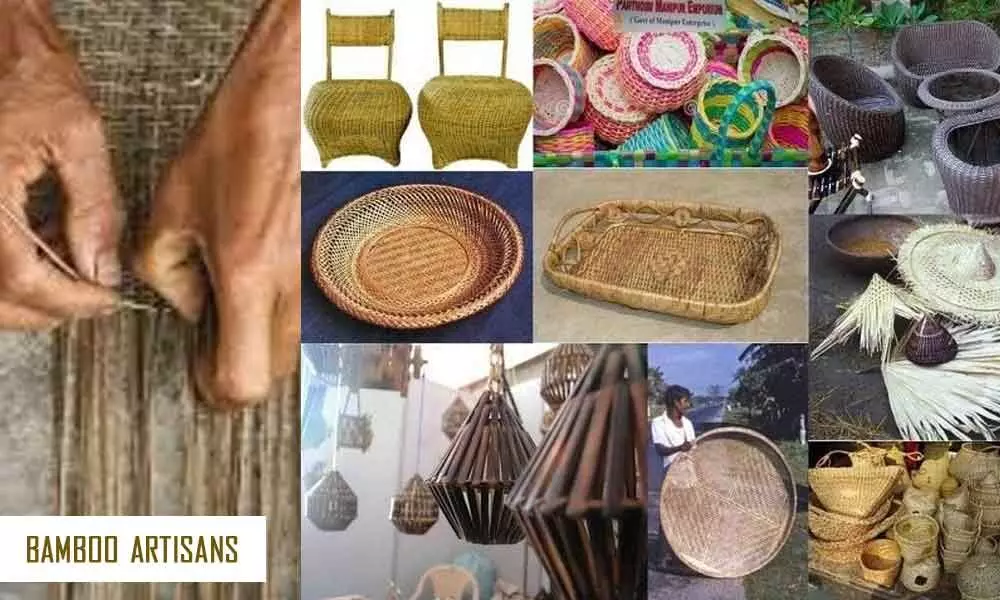
Withering away: Bamboo artisans suffer hardships in Hyderabad
- Covid crisis affects livelihoods of traditional artisans who craft wonders with bamboo
- After casting a shadow on livelihoods of Ganesh and Durga idol makers, the Covid fallout severely affects bamboo craftsmen
- With govt putting restrictions on festivities and religious gatherings, devotees are placing orders for effigies of short heights
Hyderabad: After the lockdown restrictions took a toll on livelihoods of idol makers, now it is the turn of bamboo craftsmen to feel the heat. They are Buruds. The word Burud is said to come from a Sanskrit word 'Buruda' meaning maker of basket or mats based on bamboo produce.
basket-maker, mat-maker". People of this caste are recognized by their traditional occupation In the old days, Buruds used to be solely dependent on bamboo craft for their sustenance, but with people's taste changing in favour of other wood and metallic articles, bamboo-based livelihood is no more viable.
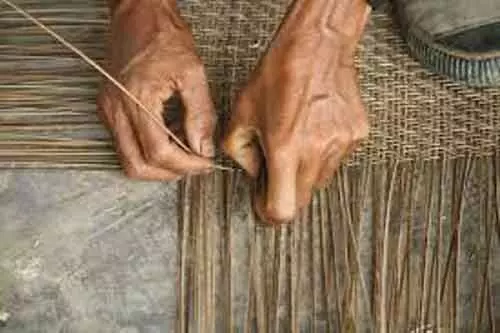
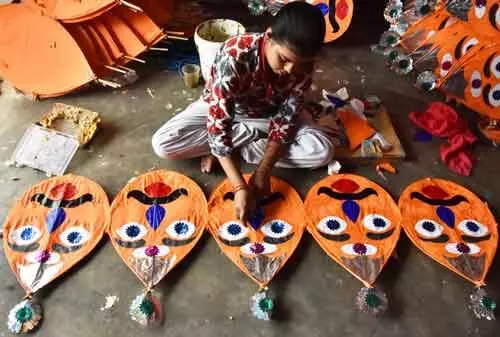
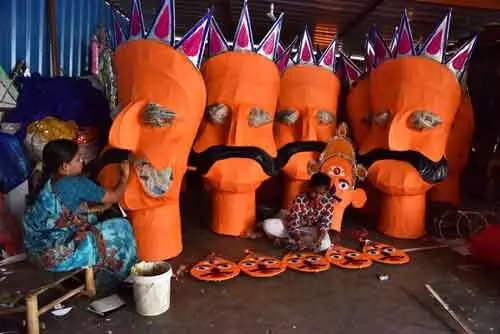
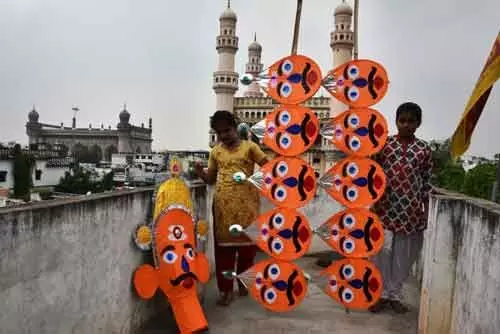
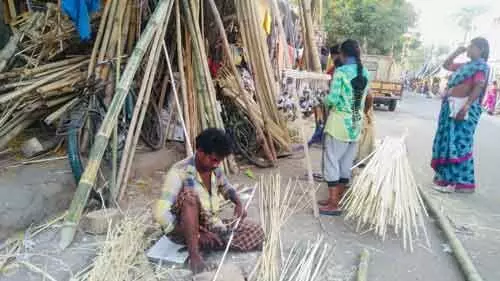
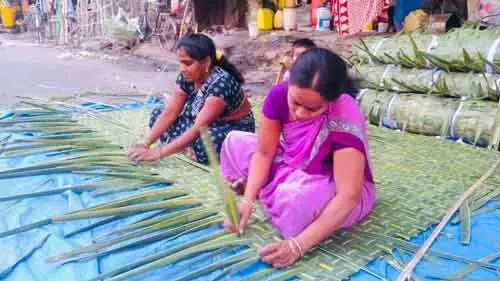
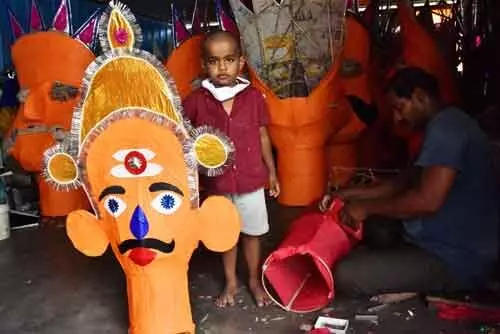
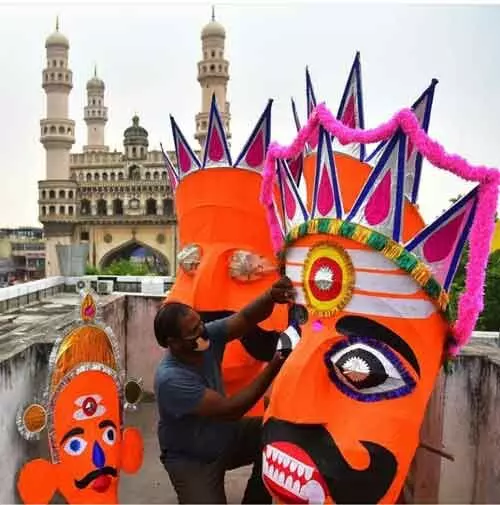
They gradually branched out into making effigies of gods and demons to be used during Hindu festivals. They also have become adept at making different articles such as mats, ladders, baskets, trays and fans. It has been proven that bamboo can be used to make a range of several articles from benches and chairs to swings, slides, and even dustbins.
Dasara is a major Hindu festival that celebrates the victory of good over evil. Devotees celebrate Navratri by welcoming Goddess Durga and conduct pujas for Her in pandals. Craftsmen make huge effigies of Ravana to be burnt on the last day of Navratri.
With the government putting restrictions on celebrations and religious gatherings as part of Covid precautions, it has affected the livelihood of people who were pinning hopes on festival season to earn some money. Some of them earn an entire year's income by making bamboo effigies during the Dasara festival.
"Earlier we used to make at least 70 huge effigies of Ravana during Dasara starting from a minimum 10 feet height to a huge 50 feet, but now in Covid times there are hardly 20 orders for effigies and that too of small size," said P Sai Kumar, one of the owners of P Balaiah & Sons shop located near Charminar. He said this year they did not receive many orders for effigies. Hardly they received 10 orders from the oldest temples in the city.
Also, due to the fear of Coronavirus, the devotees ordered small size effigies of just 6 feet to 10 feet. Several oldest temples in city including the Sri Venkateshwara Swami Temple in Karmanghat, temples in Nagole, Rakshapuram, Chandrayanagutta, Bandlaguda, Champapet, and Temple beside Nizam College which install effigies of more than 50 feet high have reduced the sizes of effigies," he informed.
Because of lockdown, there is no import of bamboo. The material used in making effigy is costlier compared to previous years. "The effigy costs in the range of Rs 6,000 to Rs 50,000 according to the size."
Sai Kumar said that his shop is one of the oldest in the city, and has been doing business for 80 years. At present, it being run by the fourth generation. These craft people survive by making the products made of bamboo such as Bonalu's jhule, Dasara's Ravana, Moharram's sehre and Diwali's tumdhi etc. "Several festivals have passed including Bonalu, Moharram on a low-key, impacting the businesses. Now we hope that the Daaera festivities bring the much-needed relief for survival," he added.
These craftsmen also live in Chaderghat, near Exhibition Grounds in Nampally. In Chaderghat, there are at least 100 families and at Nampally there are 225 huts with a size of 8*8 identified by their MCH house numbers. Families representing different religions and castes, continue to stay side by side settling an example of communal amity.
Some of the families started settling down in the lane about 60 years back and their third generation is trying their hand at a new variety of products. Bamboo craft work includes flag sticks, canes for kulfi and sugar candy, baskets, mandap installations for marriages, chilman (curtain) support and other decoration works particularly for marriages.
D Narsimha, a craft maker, said that for summer special chilman are made with four bamboos for each cloth and bamboos used in this cost Rs 250 to 300 each. "For making chilman, bamboo is cut into long pieces and the product is made by using thread," he explained.
"The lockdown has severely affected our livelihood as there are no functions and festival celebrations. During lockdown, people provided us food but post lockdown we are suffering a lot," said Syed Fouzia.
She said that the crafting of bamboo continues to be the family business and they take orders for marriages, wholesale craft shops and from contractors. "We make chilmans, mandaps, sticks etc. As and when we get orders, we purchase Assam bamboo, coconut leaves from shops and come up with the products which are demanded," she added.

© 2024 Hyderabad Media House Limited/The Hans India. All rights reserved. Powered by hocalwire.com






